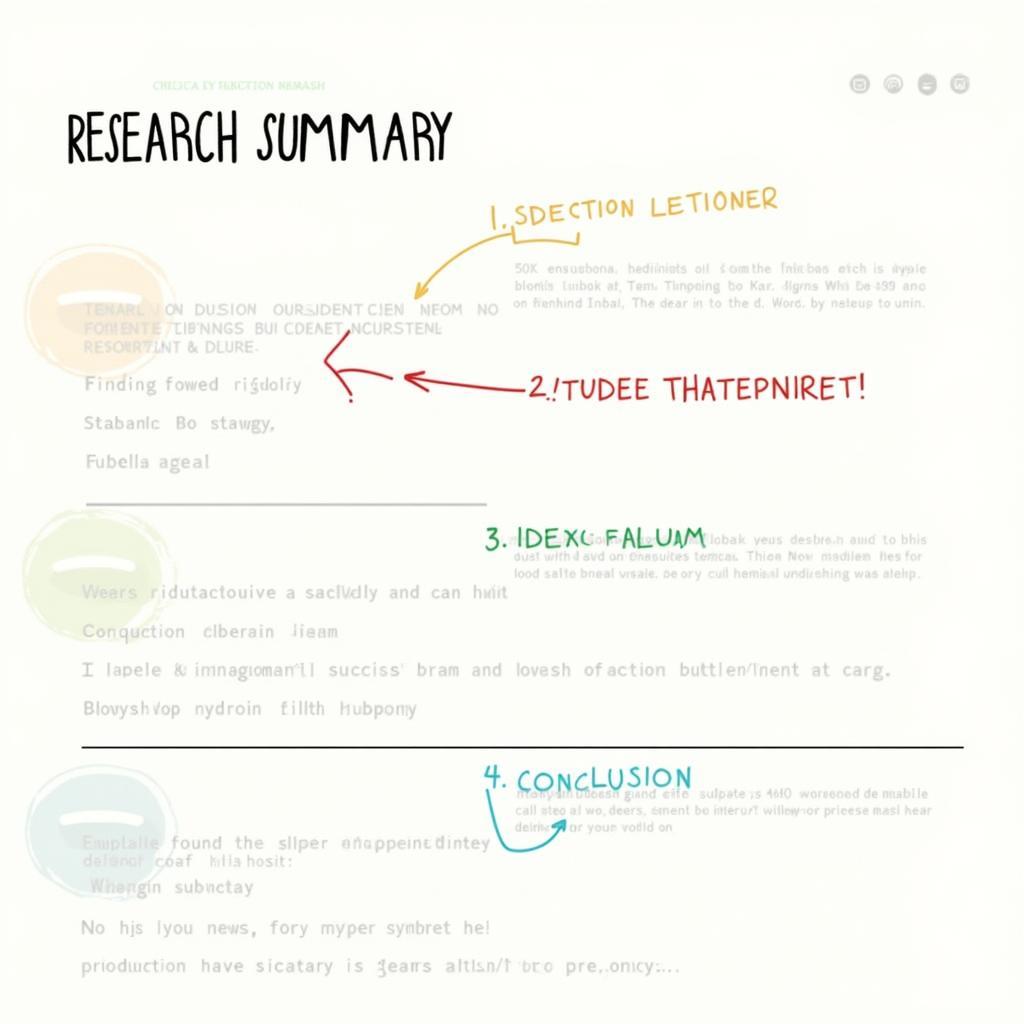Writing a research paper is a journey, and like any good journey, it culminates in a memorable summary of your findings. This summary, often called an abstract or executive summary, serves as a concise overview of your research paper, enticing readers to delve deeper into your work.
 Structure of a Research Paper Summary
Structure of a Research Paper Summary
Understanding the Importance of a Research Summary
Before we dive into the “how-to,” let’s first understand why mastering the art of writing a summary of a research paper is crucial. Imagine yourself at a bookstore, browsing countless titles. You wouldn’t have the time to read every book that piques your interest, would you? A research paper summary acts as that intriguing blurb on the back of a book, giving readers a glimpse into the research paper’s core and convincing them that it’s worth their time.
Key Elements of a Research Paper Summary
A well-structured research paper summary, regardless of the research topic, typically includes the following key elements:
- Introduction: Briefly state the research question or problem addressed in your paper. This sets the stage for what your research aims to achieve.
- Methodology: Outline the methods you used to conduct your research. This could include surveys, experiments, or analysis of existing data.
- Findings: Clearly present the main results of your research. This is the heart of your summary, where you highlight the most significant discoveries.
- Conclusion: Summarize the implications of your findings and their significance to the field of study. Reiterate the answer to your research question, if applicable.
 Example of a Concise Research Summary
Example of a Concise Research Summary
Steps to Craft a Compelling Research Paper Summary
Now, let’s break down the process of writing a summary of a research paper into manageable steps:
1. Complete Your Research Paper
It might seem counterintuitive, but writing your research paper before the summary is often more effective. Why? Because trying to condense your research before it’s fully formed can feel like fitting a square peg into a round hole.
2. Identify Your Target Audience
Before putting pen to paper (or fingers to keyboard), consider who will be reading your summary. Are they experts in your field, or are you writing for a broader audience? Tailoring your language to your reader’s expertise will ensure your summary is clear and engaging.
3. Extract the Essentials
Once you have a complete research paper, highlight the key points from each section: introduction, methodology, findings, and conclusion. These highlights will form the backbone of your summary.
4. Condense and Synthesize
Remember, brevity is key. Use clear, concise language to summarize your research, avoiding jargon or overly technical terms whenever possible. Each sentence should pack a punch, conveying maximum information with minimal words.
5. Write a First Draft Without Looking Back
Resist the urge to constantly refer back to your research paper while drafting your summary. Write freely, focusing on capturing the essence of your work in your own words.
6. Revise and Refine
Once you have a draft, take a step back and review it with a critical eye. Ensure your summary flows logically and accurately represents your research. Don’t be afraid to revise and refine until you’re satisfied with the final product.
Tips for Writing an Effective Research Paper Summary
Here are a few additional tips to help you write an effective summary:
- Use active voice: Active voice makes your writing more direct and engaging.
- Avoid using abbreviations or acronyms: Unless they are widely known within your field.
- Proofread carefully: Errors in grammar and spelling can detract from the credibility of your work.
- Adhere to word count limits: Journals and conferences often have strict word count limits for abstracts.
- Seek feedback from peers: Having another set of eyes review your summary can help identify areas for improvement.
 Proofreading a Research Paper Summary
Proofreading a Research Paper Summary
Conclusion
Writing a compelling summary of a research paper is an essential skill for any researcher. A well-crafted summary can make your work stand out, attract readers, and ultimately contribute to the advancement of knowledge. By following these tips and putting in the effort, you can ensure your research gets the attention it deserves.
FAQs about Writing Research Paper Summaries
1. What is the difference between an abstract and an executive summary for a research paper?
While both provide a concise overview of the research, an abstract is typically shorter (150-250 words) and focuses on the research problem, methodology, and findings. An executive summary, often used for longer research reports, can be more detailed (1-2 pages) and may include recommendations or implications for future research.
2. How can I make my research paper summary more engaging for readers?
Start with a strong opening sentence that captures the reader’s attention. Use clear and concise language, avoiding jargon. Highlight the most significant findings and their implications. Conclude with a sentence that leaves the reader wanting to learn more.
3. Can I use bullet points or numbered lists in my research paper summary?
While not always standard practice, using bullet points or numbered lists can be acceptable in some cases, especially if it enhances the clarity and readability of your summary. Check the specific guidelines of the publication or institution you are submitting to.
4. What are some common mistakes to avoid when writing a research paper summary?
Avoid including information that is not presented in the main body of your paper. Don’t use overly technical language or jargon that your audience may not understand. Do not include your own opinions or interpretations of the findings in the summary.
5. Where can I find more resources on writing effective research paper summaries?
Consult writing guides specific to your discipline, such as “A Manual for Writers of Research Papers“. You can also find helpful resources online, like “college research paper examples” or “sample executive summary for research paper“, to guide your writing process.
Remember, writing a good summary takes practice. Don’t be discouraged if your first few attempts aren’t perfect. Keep refining your skills, and you’ll soon be crafting summaries that effectively communicate the value of your research!
Need further assistance with your research paper? Our team is here to help! Contact us at 0904826292, email us at [email protected], or visit our office at No. 31, Alley 142/7, P. Phú Viên, Bồ Đề, Long Biên, Hà Nội, Việt Nam. We offer 24/7 customer support to address your research needs.